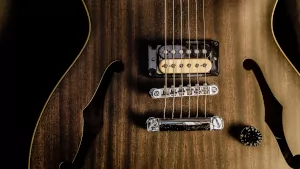Your guitar is more than simply a musical instrument; it is a prized item that requires proper maintenance and attention. Regular maintenance is required to guarantee that your guitar performs optimally, continues in good shape, and is a delight to play for many years to come. Whether you own an acoustic, electric, or classical guitar, a few easy maintenance methods can significantly improve its longevity and overall performance. In this post, we’ll look at some useful guitar maintenance and care suggestions.
Polishing and cleaning
The basis of guitar maintenance is regular cleaning. After each playing session, wipe down the strings, fretboard, and body of the guitar. To remove sweat, oils, and grime that can develop over time and harm the finish and playability of the guitar, use a soft, lint-free cloth. To condition and protect the wood on the fretboard, use a small amount of lemon oil using a soft cloth.
Invest in a premium guitar polish that is appropriate for your instrument’s finish (e.g., nitrocellulose, polyurethane, or oil finish). Avoid using household cleaners since they may contain strong chemicals that will damage the finish of the guitar.
Learn to Play the Guitar
Make Your Guitar Moist
Wood is an important component of your guitar, and it is sensitive to humidity changes. Too much or too little moisture in the air can cause the wood to expand or shrink, perhaps causing structural problems or changes in playability. To avoid these issues, keep your guitar in an atmosphere with a consistent humidity level, ideally between 40% and 50%. To preserve the wood from drying out during dry seasons or if you reside in an arid climate, use a guitar humidifier.
Keep Your Guitar Safe from Harmful Environments
Extreme temperatures might be harmful to the health of your instrument. Excessive heat might cause the wood to warp and the finish to bubble if left in a hot car or in direct sunlight for an extended period of time. Similarly, extremely low temperatures can cause cracks or structural damage to the instrument. To safeguard your guitar from severe temperatures, store it in a climate-controlled setting whenever possible.
Check Hardware and Electronics on a Regular Basis
It is critical for electric guitar players to inspect and repair the hardware and electronics. Look for signs of wear or damage on the tuning machinery, bridge, and nut. Tighten any loose screws and double-check that all parts are secure. Consult a certified guitar technician for repairs if you notice any problems with the electronics, such as crackling sounds or intermittent connections.
Strings should be changed on a regular basis.
Strings will gradually lose their brilliance and intonation due to wear and tear. The frequency with which you should change your strings is determined by factors such as how frequently you play and the type of strings you use. Strings should be changed every 1 to 3 months as a general rule. Regular string replacements not only maintain your guitar sounding great, but they also help to keep filth and oils off the fretboard.
Storage and transportation must be done correctly.
When not in use, keep your guitar in an appropriate guitar case or gig bag. This protects against accidental bumps, falls, and dust exposure. Always transport your guitar in a well-padded and properly fitting case or gig bag. Fasten any straps or belts securely to keep the guitar from sliding around during transit.
Get Regular Installations and Maintenance
A professional setup will enhance every guitar. A setup involves altering the neck, bridge, and action of the guitar to improve playability and intonation. A properly set up guitar is easier to play and ensures that your instrument plays to its full potential. Consider having a qualified guitar technician install your instrument at least once a year, or whenever you detect substantial changes in playability.
Finally, caring for your instrument entails regular maintenance, cleaning, and responsible storage. By following these basic but important habits, you can ensure that your guitar stays in good condition, sounds great, and serves as a source of joy and inspiration for your musical journey. If you take care of your guitar, it will reward you with lovely songs and wonderful memories for years to come.

